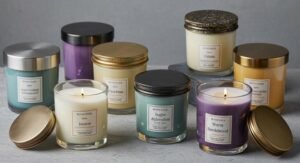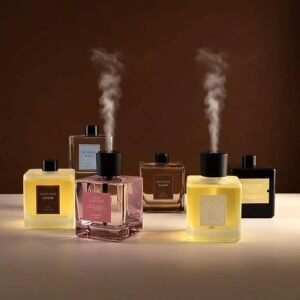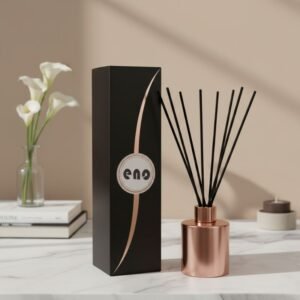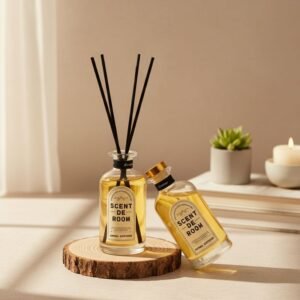Découvrir que votre parfum de marque $200 a tourné au vinaigre après seulement six mois, c'est comme un coup de poing dans le ventre. Vous avez investi dans la qualité, mais vous vous retrouvez avec un flacon qui n'a plus rien à voir avec la senteur enivrante qui vous a d'abord séduit.
Avec des techniques de stockage et d'entretien appropriées, la plupart des parfums de haute qualité peuvent conserver leur caractère original pendant 3 à 5 ans après ouverture, et les flacons scellés peuvent durer 10 à 15 ans ou plus. La clé consiste à protéger vos parfums de la lumière, de la chaleur et de l'exposition à l'air, tout en maintenant des conditions de stockage cohérentes.
Quels sont les trois principaux ennemis de la longévité des parfums ?
La chaleur, la lumière et l'exposition à l'air forment la trinité de la destruction des parfums. Ces éléments agissent de concert pour dégrader la structure moléculaire délicate qui compose la signature olfactive unique de votre parfum.
Il est essentiel de comprendre ces trois ennemis : La lumière UV décompose les molécules de parfum et provoque une décoloration, la chaleur accélère l'évaporation et la dégradation chimique, et l'exposition à l'oxygène entraîne une oxydation qui ternit les notes de tête et altère la composition globale.
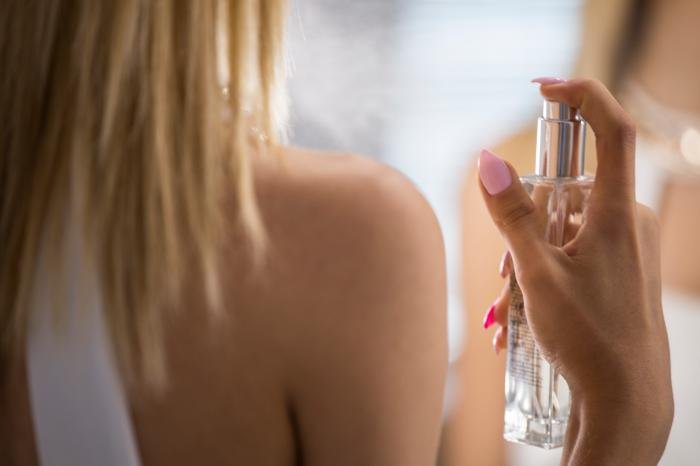
La science derrière la décomposition des parfums
La chaleur agit comme un catalyseur qui accélère les réactions chimiques à l'intérieur de votre flacon. Lorsque les températures fluctuent ou restent constamment élevées, la base alcoolique s'évapore plus rapidement et les huiles parfumées commencent à se séparer. J'ai observé des parfums conservés dans des voitures chaudes se transformer complètement en quelques semaines.
L'exposition à la lumière, en particulier aux rayons UV, provoque une photodégradation. Ce processus décompose les chromophores dans les molécules du parfum, entraînant des changements de couleur et d'odeur. Imaginez cela comme un tissu qui se décolore au soleil – votre parfum subit des dommages moléculaires similaires.
| Ennemi | Effet sur le parfum | Chronologie | La prévention |
|---|---|---|---|
| Chaleur | Accélère l'évaporation | De quelques jours à quelques semaines | Stocker à une température inférieure à 20°C (68°F) |
| Lumière | Décompose les molécules | Des semaines aux mois | A conserver dans les endroits sombres |
| Air | Cause de l'oxydation | Des mois aux années | Minimiser l'exposition |
L'exposition à l'oxygène crée des réactions d'oxydation qui affectent particulièrement les notes de tête. Ces composés plus légers et plus volatils réagissent en premier, ce qui explique pourquoi les agrumes et les parfums frais s'estompent plus rapidement que les parfums boisés ou orientaux. Plus vous ouvrez et utilisez votre parfum, plus l'air s'introduit, modifiant progressivement le profil de la senteur.
Où conserver le parfum pour une longévité maximale ?
Le lieu de stockage idéal maintient des températures fraîches constantes, bloque la lumière et minimise les fluctuations d'humidité. Le placard de votre chambre à coucher ou un tiroir dédié remplissent souvent mieux ces conditions que des choix évidents comme la salle de bains.
Les parfums doivent être conservés dans leur boîte d'origine, dans un endroit frais et sombre, comme un placard ou un tiroir, à une température comprise entre 15 et 20 °C, avec un taux d'humidité minimal et une exposition nulle à la lumière pour une conservation optimale.
Guide de rangement pièce par pièce
Les salles de bain représentent le pire lieu de stockage possible malgré leur commodité. La combinaison de la vapeur des douches chaudes, des fluctuations de température et de l'humidité crée une tempête parfaite pour la dégradation du parfum. Je l'ai testé moi-même – des parfums identiques conservés en salle de bain contre dans un placard présentent des différences spectaculaires après seulement trois mois.
Les chambres à coucher offrent d'excellentes possibilités de stockage, en particulier dans les tiroirs des commodes ou les placards. Ces espaces conservent des températures relativement stables et restent sombres la plupart du temps. Évitez les rebords de fenêtre ou les surfaces situées à proximité des bouches de chauffage, car la lumière et la chaleur, même indirectes, peuvent causer des problèmes.
Les cuisines présentent des résultats mitigés. Les garde-manger peuvent donner de bons résultats, mais les espaces situés près des cuisinières ou des fenêtres ensoleillées créent des variations de température qui endommagent les parfums. Le réfrigérateur devient une option pour le stockage à long terme, bien qu'il faille tenir compte de la constance de la température.
| Localisation | Stabilité de la température | Exposition à la lumière | Humidité | Recommandation |
|---|---|---|---|---|
| Salle de bains | Pauvre | Faible | Haut | Éviter |
| Chambre Placard | Excellent | Aucun | Faible | Idéal |
| Cuisine Pantry | Bon | Aucun | Moyen | Acceptable |
| Réfrigérateur | Excellent | Aucun | Faible | Cas particuliers |
Le réfrigérateur mérite une mention spéciale pour les collectionneurs ou les personnes vivant dans des climats extrêmement chauds. Bien que la température fraîche constante ralentisse la dégradation, les changements de température fréquents dus à l'extraction des bouteilles peuvent provoquer de la condensation. Réservez cette méthode à vos parfums les plus précieux ou rarement utilisés.
Comment manipuler les flacons de parfum au quotidien ?
Votre interaction quotidienne avec les flacons de parfum impacte significativement leur longévité. De simples habitudes comme un bouchage correct, une manipulation douce et des techniques d'application stratégiques peuvent prolonger la vie de votre fragrance de plusieurs années.
Remettez toujours les bouchons en place immédiatement après usage, conservez les flacons en position verticale, évitez de pomper ou de tester les pulvérisations de manière excessive et manipulez les flacons avec des mains propres afin d'éviter toute contamination et de préserver l'intégrité du parfum.
Meilleures pratiques en matière d'applications
La façon dont vous utilisez votre parfum influe directement sur sa durée de vie dans le flacon. Des pulvérisations d'essai excessives gaspillent le produit et introduisent davantage d'air dans le flacon. Au lieu de cela, vaporisez directement sur votre peau à une distance optimale de 6 à 8 pouces.
Le positionnement des bouteilles a plus d'importance que la plupart des gens ne le pensent. Conservez toujours les bouteilles à la verticale afin d'éviter que l'alcool ne vienne s'appuyer sur le mécanisme de l'atomiseur. L'alcool peut corroder les composants métalliques au fil du temps, ce qui entraîne l'obstruction des vaporisateurs ou des fuites qui gaspillent votre précieux parfum.
La sécurité du bouchon constitue votre première ligne de défense contre l'évaporation. Même des bouchons légèrement desserrés permettent à l'alcool de s'évaporer et à l'air de pénétrer. Je recommande de bien visser le bouchon après chaque utilisation – pas trop fort pour éviter d'endommager le filetage, mais suffisamment pour assurer une étanchéité hermétique.
Routine de nettoyage et d'entretien
Un nettoyage régulier du flacon prolonge à la fois la vie du parfum et la fonctionnalité du contenant. Utilisez un chiffon doux et non pelucheux pour éliminer les empreintes digitales, la poussière et tout résidu pouvant s'accumuler autour de l'embout vaporisateur. Cela empêche l'accumulation qui pourrait affecter le mécanisme de pulvérisation.
Pour les bouteilles anciennes ou de collection, pensez à utiliser des gants de coton blanc pour les manipuler. Les huiles de la peau peuvent interagir avec certains matériaux ou étiquettes des flacons au fil du temps. Cela peut sembler excessif, mais pour les parfums rares valant des centaines ou des milliers d'euros, cette précaution supplémentaire est payante.
Les chocs thermiques constituent un autre problème quotidien. Transporter des flacons de parfum froids d'un espace climatisé à un environnement chaud (ou vice versa) provoque des dilatations et des contractions qui peuvent affecter les joints et les vaporisateurs. Laissez les flacons s'adapter progressivement à la température ambiante lorsque vous les déplacez d'un environnement à l'autre.
Quand faut-il envisager l'entreposage des réfrigérateurs ?
L'entreposage frigorifique est plus efficace dans des situations spécifiques qu'en tant que règle générale. Les climats extrêmes, les bouteilles anciennes de grande valeur ou les scénarios de stockage à long terme justifient la complexité supplémentaire du stockage réfrigéré.
Envisagez la conservation au réfrigérateur pour les parfums dont la température est supérieure à 25°C (77°F), pour les flacons anciens ou coûteux utilisés rarement, ou pour les parfums conservés pendant plus de cinq ans, tout en évitant les températures de congélation qui peuvent endommager la structure des parfums.
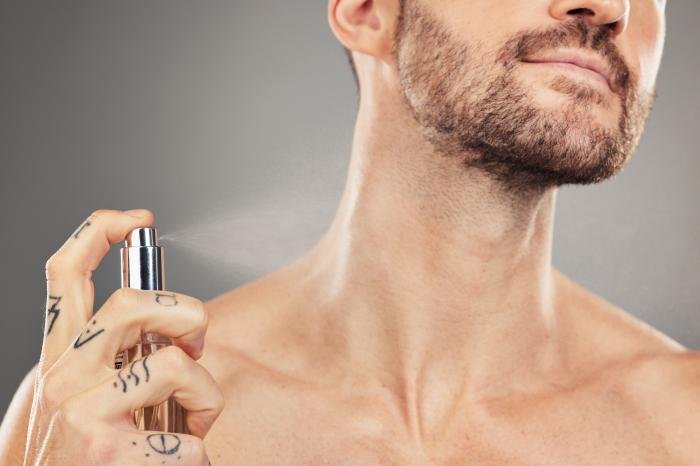
Quand la réfrigération prend tout son sens
Lorsque l'on vit dans un climat tropical ou désertique, où la température ambiante dépasse régulièrement 25°C (77°F), la réfrigération mérite d'être envisagée. La température fraîche constante ralentit considérablement les réactions chimiques à l'origine de la dégradation. Toutefois, cela ne fonctionne que si vous pouvez maintenir des températures constantes dans le réfrigérateur et minimiser la fréquence d'enlèvement.
Les parfums anciens de grande valeur ou les éditions limitées tirent le meilleur parti d'une conservation au réfrigérateur. Ces flacons représentent souvent des pièces irremplaçables qui justifient des efforts de conservation supplémentaires. L'investissement dans un stockage adéquat est payant lorsqu'un flacon vintage $500 conserve son caractère original des décennies plus tard.
Pour les situations de stockage à long terme, comme les collections héritées ou les pièces d'investissement, la réfrigération fonctionne bien. Si vous ne prévoyez pas d'utiliser certains flacons pendant des années, le réfrigérateur offre d'excellentes conditions de conservation.
Risques et précautions liés à la réfrigération
Les cycles de température constituent le plus grand risque lié au stockage réfrigéré. L'entrée et la sortie des bouteilles du réfrigérateur provoquent de la condensation qui peut endommager les étiquettes, corroder les composants métalliques ou même affecter le parfum si de l'humidité pénètre dans la bouteille. Établissez une routine qui minimise la fréquence des sorties.
L'absorption d'odeurs est un autre problème dans les espaces réfrigérés partagés. Les flacons de parfum peuvent absorber les odeurs fortes des aliments, tandis que le parfum lui-même peut parfumer les aliments voisins. Utilisez une section dédiée ou un récipient scellé pour éviter toute contamination croisée.
Ne conservez jamais vos parfums au congélateur. Les températures de congélation peuvent provoquer la dilatation du liquide, ce qui risque de fissurer les flacons ou d'endommager les atomiseurs. Le froid extrême affecte également la composition chimique, ce qui n'est pas le cas d'un stockage à température ambiante.
Conclusion
Un bon entretien des parfums associe des choix de stockage intelligents à des habitudes quotidiennes réfléchies, protégeant ainsi votre investissement tout en préservant les senteurs captivantes que vous aimez le plus.

